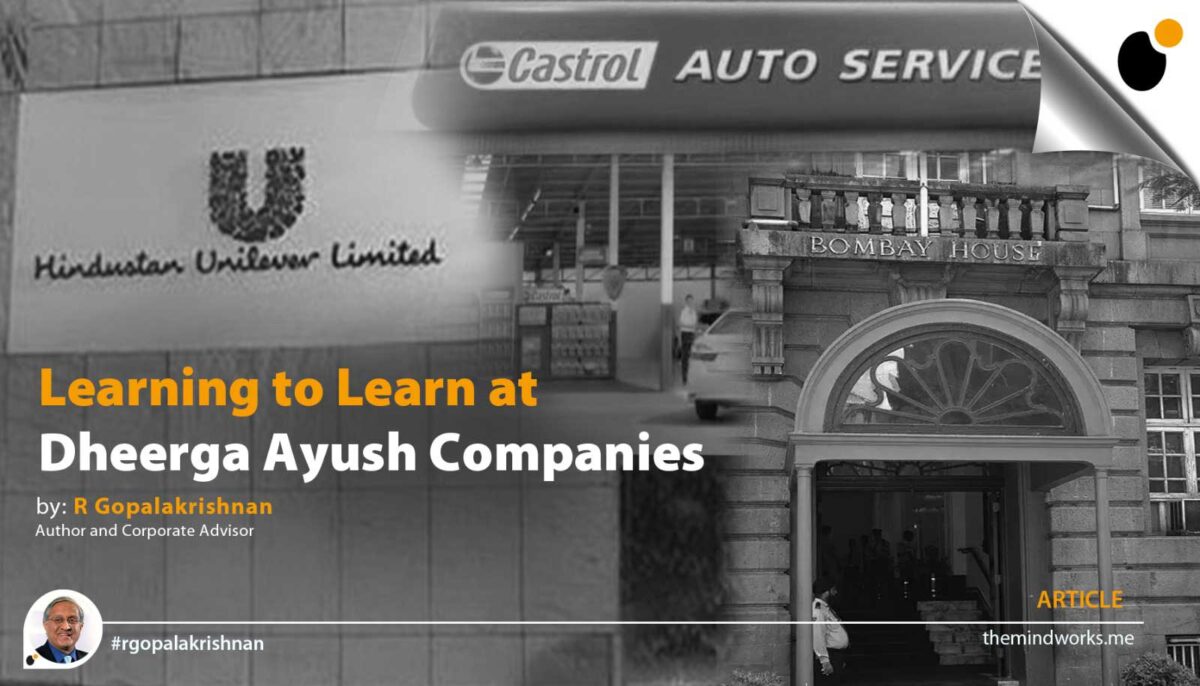By R Gopalakrishnan*
*The writer is an author. His latest book, JAMSETJI Tata—powerful learnings for corporate success, coauthored with Harish Bhat, was published in July 2024. His ID is rgopal@themindworks.me
Who does not wish to set up and nurture institutions with a long life? Dheerga Ayush or flourishing multi-generational companies nurture engaged employees. Many executives cease to keep their curiosity alive as their career progresses. When you cease to learn, you lose engagement with work. Employee engagement data over thirty years shows a temporal decline across companies and regions. That is why Dheerga Ayush companies like Tata, Castrol Hindustan Unilever track their employee engagement regularly.
Professor Barry Schwartz, a noted American psychologist and academic, has written and spoken about ‘Why We Work’. According to him, Adam Smith opined that human beings are lazy and would not do anything unless the employer made it worthwhile: this led to the factory system with a focus on the number of hours worked.
There has been a hammer and tongs debate about how many hours per week a person should work. Leaders who spoke did so within a context. I have no intention of stoking the dying embers of this fire. Rather, I wish to explore what work is, especially knowledge-based work. Presumably all our ancestors did not enjoy work, though many of them led a fulfilling life. We work because we desire a ‘fulfilling’ life. Well, what is a fulfilling life?
Fulfilment presumes that there is some deep ambition and a personal purpose. It may be prosaic like feeding your family, or philosophical, like providing music as soup for the soul. Why should anybody assume that the next generation—they are described through alphabets like X, Z, and Alpha—not be like our ancestors insofar as they too wish to work to fulfil their purpose. When a purpose is fulfilled, work is enjoyed, and the number of hours doesn’t matter.
When I began work six decades ago, I wanted to write computer code, a desire that changed with time and experience. At my interview, Hindustan Lever asked me whether I would consider a career in marketing instead of systems and programming. I was bold—or foolish–enough to decline. A future chairman, T Thomas, told us during our induction in a matter-of-fact manner, “If you are not buying, manufacturing, or selling, you are not in operations.” It was mandatory to learn the grassroots of operations irrespective of the stream of work.
So, I landed up selling Surf in Nashik, Erasmic Cup Soap in Nagpur, and dispatching goods from Mumbai’s Sankli Street warehouse for several months. Thereafter, I was packed off to the factory to study how to plan production so that all six colors of Lux would be available for consumers simultaneously. Was it ‘fascinating’ to visit forty grocery shops every day to transact orders after studying physics and computer science? Or to watch how the soap packing machines had to be cleaned for several hours for every color change? Gosh no. But did help me to understand how to analyze the system and write code for a better outcome.
What was my lesson? That you enjoy work when you are learning new things. And that you learn new things when you are curious and respectful about work. Learning means personal growth, which nudges you towards your purpose. The employee must be curious, and the employer must provide the employee with work that converts natural curiosity into relevant learning.
There is no place for number of hours in this formula!! That is what start up founders call passion, that is what top-class musicians call riyaz, that is what sportsmen call relentless practice. There are so many paths for a top-class cricketer, for example, to develop. Some have relentless coaching and others like K Srikkanth and Varun Chakravarti were largely self-taught. It is the individual who defines what the criterion of success is.
Our older generations never treated their next generation as ‘immature, wayward, or indolent.’ If they did, our generation would not have surpassed our parents’ in accomplishments and advancements. The narrative, therefore, is not how many hours but what fulfils. And fulfilment and purpose evolve with experience.
I close with a recent narrative about a person called Mr Tamil in Nilgiris. Yes, that is the name his parents gave him, long before MK Stalin made a virtue of Tamil in relation to Hindi. He studied in a convent school, graduated with a B Com from a college, both in Nilgiris, and secured a bank job for two years. Following bereavements in the family, Tamil felt his ‘purpose’ was to be at home with his lonely, ageing father. Upon return to his home, he could only get the job of a car driver. It enabled him to look after his father and achieve what he considered his purpose. I have not met a happier person than Tamil. He was not counting his hours of work, rather he was fulfilling his purpose.
Employee engagement is essential for Dheerga Ayush companies. It is not a human resources issue; it is a leadership issue.



